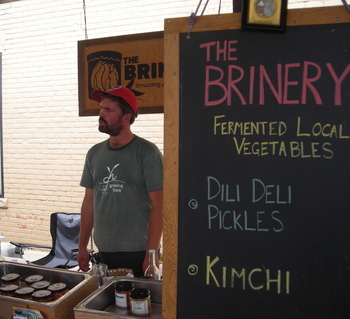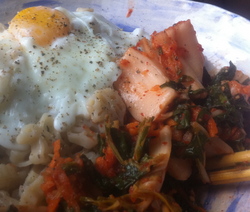The Brinery: Lacto-fermentation keeps veggies raw and vibrant

David Klingenberger can be found at the Ann Arbor Farmers Market on Wednesdays and Saturdays and Lunasa Market every other Tuesday.
Corinna Borden | Contributor
Lactobacillus is one of the many symbiotic bacteria living in our guts to aid us with digestion. Lacto-fermentation is the process of actively feeding lactobacillus, and starving less desirable bacteria such as Clostridium Botulinum (which causes botulism), by covering whole or chopped vegetables in a saltwater brine. When kept at a constant cold temperature vegetables will continue to ferment, releasing gases and remaining safe for consumption.
“What I love about fermented vegetables is that it is the most ancient form of preserving vegetables,” says Klingenberger.
The difference between lacto-fermentation and preserving vegetables in a vinegar brine is that lacto-fermentation keeps the vegetables raw. The Brinery sells vegetables that are still raw. Abundant lactobacillus, fed by the salt, breaks down the carbohydrates in the vegetables - partly pre-digesting the vegetables before they reach your stomach, but nothing is cooked. When one purchases sauerkraut in a container from the shelf the cabbage was preserved raw and then cooked in order to be heat-sealed in the jar. Traditionally, you can bury crock-pots of kimchi or sauerkraut below the frost line in the ground to maintain the cooler temperature; Klingenberger uses refrigeration.
The longer one keeps vegetables that have been preserved using lacto-fermentation the more they are fermented. Klingenberger shares that the flavor “will just get more intense,” and I agree with that. I will also add that when I opened a jar of kimchi after two weeks vegetables rose up to meet me, traditional crock-pots siphon off the gases that glass jars cannot.
Klingenberger started working as an organic farmer with Tantre Farm 12 years ago. His ideal, “would be to have all organic local produce in my products, but I can’t do that - so my next step is to Michigan local grown - I am not into buying organic product from California.”

A simple dinner of local kimchi, pasta, and poached eggs from our girls.
Corinna Borden | Contributor
Corinna volunteers with the Westside Farmers Market and wrote a book about choosing Peace over Fear.

